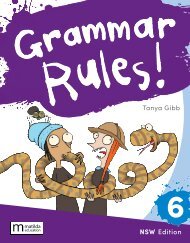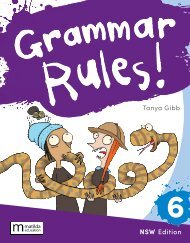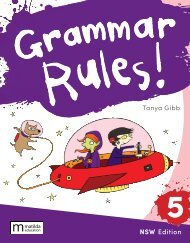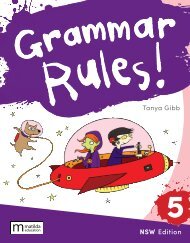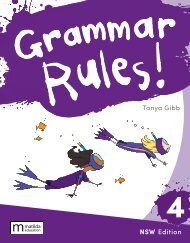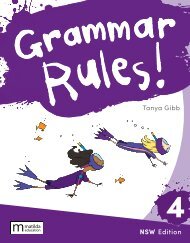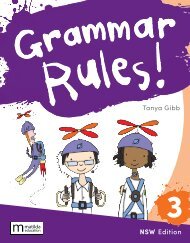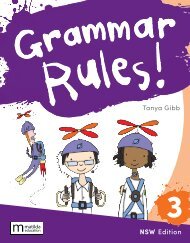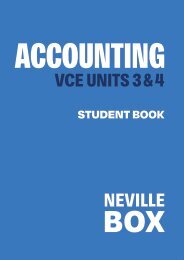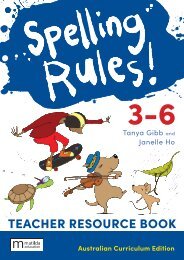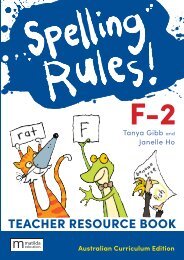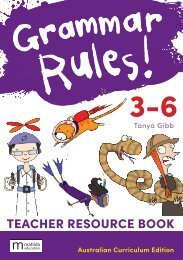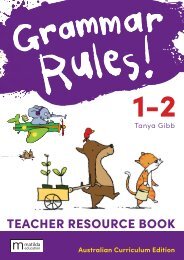Good Science Victorian Curriculum Year 7
Digital sample of Matilda's newest publication, Good Science Victorian Curriculum Year, authored by Emma Craven and Aaron Elias. For more information visit www.matildaeducation.com.au or email Katrina Tucker, katrinatucker@matildaed.com.au
Digital sample of Matilda's newest publication, Good Science Victorian Curriculum Year, authored by Emma Craven and Aaron Elias. For more information visit www.matildaeducation.com.au or email Katrina Tucker, katrinatucker@matildaed.com.au
Create successful ePaper yourself
Turn your PDF publications into a flip-book with our unique Google optimized e-Paper software.
CHAPTER 4: STATES OF MATTER<br />
2<br />
3<br />
4<br />
Liquids can freeze to solids when cooled<br />
Freezing is the change of a liquid to a solid when cooled. It is the<br />
opposite of melting.<br />
The particles in a liquid have enough energy to move around each<br />
other. If you cool a liquid, you remove heat energy and cause the<br />
particles to move more slowly. If particles lose enough energy, they no<br />
longer move around, but instead just vibrate in place. The substance is<br />
now a solid.<br />
Freezing is when a liquid becomes which state of matter?<br />
Liquids can evaporate to gases when<br />
heated<br />
Evaporation is the change of a liquid to a gas.<br />
Evaporation can happen at any temperature. In any liquid, some of<br />
the particles will randomly have enough energy to break away from<br />
the others. These particles leave the surface of the liquid as a gas.<br />
Evaporation is the reason that a puddle will eventually shrink and<br />
disappear, even during cool weather.<br />
Boiling is evaporation that<br />
Figure 4.14 Particles near the<br />
happens when a liquid is<br />
surface of a liquid become a<br />
heated to its boiling point. gas during evaporation.<br />
This point is different for<br />
every substance. When they<br />
have enough heat energy,<br />
Gas<br />
particle<br />
the particles in the liquid<br />
move so quickly that they<br />
become a gas inside the<br />
Particles with<br />
enough energy<br />
liquid. This gas can be seen<br />
will leave the<br />
as bubbles that rise through<br />
liquid as gas<br />
the liquid and escape.<br />
Liquid particle<br />
What is an example of evaporation?<br />
Gases can condense to liquids when cooled<br />
Condensation happens when a gas changes to a liquid when cooled.<br />
It is the opposite of evaporation.<br />
Gas particles move very quickly, so they remain separate from the<br />
other particles. However, if you remove heat energy and slow the particles<br />
down, they no longer have enough speed to overcome the attraction of<br />
the other particles. They move closer together to become a liquid.<br />
Have you ever seen water drops form on the outside of a cold glass<br />
of water? That’s condensation.<br />
What happens when gas particles slow down?<br />
Investigation 4.4<br />
Exploring melting points<br />
KEY SKILL<br />
Representing data<br />
Go to page 152<br />
CHECKPOINT 4.4<br />
1 Copy and complete these<br />
sentences.<br />
Changes in<br />
happen<br />
when heat<br />
is<br />
or<br />
from a substance.<br />
2 From each pair, identify which<br />
state of matter has particles<br />
with more energy.<br />
a Liquid or gas<br />
b Gas or solid<br />
c Solid or liquid<br />
3 Describe how heat energy<br />
affects what happens to the<br />
particles in:<br />
a a solid that is melting<br />
b a liquid that is evaporating<br />
c a gas that is condensing<br />
d a liquid that is freezing.<br />
4 Explain the difference<br />
between evaporation and<br />
condensation.<br />
5 Create a table to compare<br />
the amount of energy and<br />
distance between the particles<br />
in solids, liquids and gases.<br />
Hint: Use words such as high,<br />
low, close and far.<br />
EXTENSION<br />
6 Sublimation is when a<br />
substance changes from solid<br />
to gas, without becoming<br />
a liquid. Use evidence from<br />
the text to propose how this<br />
happens.<br />
SUCCESS CRITERIA<br />
I can describe what<br />
happens to particles during:<br />
melting<br />
freezing<br />
boiling<br />
condensation.<br />
61




